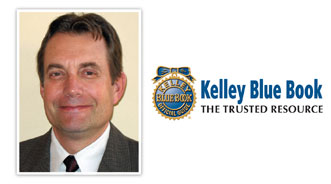KBB’s Nerad Dissects Weaknesses in Fed’s Demanding CAFE Proposal

By subscribing, you agree to receive communications from Auto Remarketing and our partners in accordance with our Privacy Policy. We may share your information with select partners and sponsors who may contact you about their products and services. You may unsubscribe at any time.
IRVINE, Calif. –
Kelley Blue Book’s Jack Nerad gathered his thoughts Wednesday and made a stiff rebuttal to the recent proclamation issued by the White House and federal regulators about future Corporate Average Fuel Economy standards.
Nerad first recapped that automakers have been told they should roll out lineups with the CAFE levels reaching 56 miles per gallon. The executive editorial director and market analyst at Kbb.com then recounted major headlines announcing the stark mandate:
—Feds Eye 56.2 MPG Standard for 2025
—Auto Manufacturers Surprised by New Fuel Efficiency Goal
—White House Wants 56 MPG
“Yet the news columns that follow the headlines are matter-of-fact,” Nerad cautioned.
“The reporting largely buys into the blithe predictions floated by proponents of drastically higher fuel economy rules that the proposed standards — which happen to be almost double the current standards — can be achieved simply by adding cost,” he continued.
“Further, the reports also echo the line that the additional costs involved in building cars that can achieve the suggested requirements will be recouped from the cost savings that will accompany higher fuel efficiency,” Nerad pointed out.
Subscribe to Auto Remarketing to stay informed and stay ahead.
By subscribing, you agree to receive communications from Auto Remarketing and our partners in accordance with our Privacy Policy. We may share your information with select partners and sponsors who may contact you about their products and services. You may unsubscribe at any time.
“But if one looks past the rose-colored predictions of the politicians (from both sides of the aisle, by the way), the picture gets cloudier,” he added.
The KBB analyst delved deeper into his refuting of the government’s claims by noting what generates plenty of activity at a typical franchise dealership — the used-vehicle department.
“First off, a typical new-car owner won’t own a unit over its entire lifetime, so one has to wonder how interested new-car buyers will be in paying significantly more for their vehicles — and an average of $2,200 is significantly more — for little obvious benefit to their own pocketbooks,” Nerad explained.
“The cynical answer to that is if they want to buy a new car, they won’t have any choice,” he suggested. “Further, the accuracy of the rosy scenario presented by proponents of the higher standards depends on correctly predicting future fuel prices, which is an iffy prospect.
“If real fuel prices are lower than those predicted, the payback-period prediction goes right out the window,” Nerad insisted.
Nerad’s Kelley Blue Book colleague, Eric Ibara, serves as the director of residual value consulting. Nerad explained how Ibara found as the industry moves to increasingly complex and expensive technology to get higher and higher fuel economy, the financial benefit to the consumer diminishes.
The KBB analysts agreed: CAFE standards and gasoline prices are inextricably linked. Yet as vehicles get more fuel efficient, they emphasized it gets increasingly more difficult to generate sufficient savings to prompt a purchase of a new, more fuel-efficient vehicle unless gasoline prices rise in dramatic fashion, as well.
“Certainly, most of us would agree that better fuel efficiency is a laudable national goal,” Nerad acknowledged.
“But any proposal that claims to move us in that direction should be thoroughly vetted to discover the unintended consequences,” he continued.
To back up that statement, Nerad offered what he believes are a few potential unintended consequences of raising the fuel economy requirements to the level proposed:
—Cost increases involved in the new technology designed to achieve the fuel efficiency goals will be accompanied by commensurate price increases for new vehicles.
—Price increases will, in turn, inhibit demand.
—Fewer new vehicles will be built, and because of that, a number of men and women involved in the manufacturing, marketing and sale of new models will suffer, and many will lose their jobs.
—Consumers will also very likely hold onto their current vehicles longer, not only limiting demand for new vehicles with the aforementioned consequences, but also keeping older, less fuel-efficient and higher-emission vehicles on the road longer.
—Because reaching the inflated fuel economy standards will require electrification strategies — conventional hybrids, plug-in hybrids and full electrics — KBB thinks the nation will become dependent upon suppliers of rare earth materials used in battery and electric-vehicle manufacturing.
The final point prompted Nerad to say, “Those elements are located, mined and processed in just a handful of countries, so we might simply be trading countries that have leverage over our destiny, rather than re-capturing the ability to direct our own future without the influence of OPEC.
“While it is easy for politicians to formulate feel-good policies for future implementation, one has to wonder if Americans are well-served by having to pay more for their cars because of new regulations that also throw new roadblocks at an industry that is one of our biggest job-producers,” Nerad concluded.


